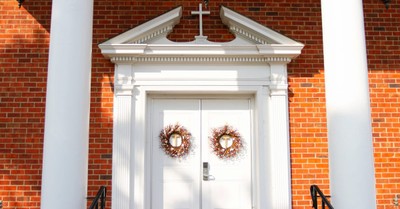Trusting God in the Storm
It was a scene from a horror movie. Rain was blowing sideways, tornado warning sirens were blaring, and baseball-sized hailstones were falling. And that was at our home, which turned out to be far from the danger zone.
You may have heard about the storms that attacked our part of the world Wednesday night. Numerous deaths and extensive damage resulted from at least three tornadoes. More than 250 people were evacuated from one neighborhood. Global news sources from England and beyond have reported on the tragedy.
The storms in our area are not the only such news in the news: Cyclone Mahasen attacked Bangladesh's coast yesterday, killing six people and forcing thousands into emergency shelters. And innocent suffering can result from human sin just as from natural disasters: We now know that government helicopters in Syria may have dropped at least two devices containing poisonous gas, killing some and sickening others. The Gosnell trial and Cleveland kidnappings are further proof that sin always affects more than the sinner.
Christianity faces no greater challenge than innocent suffering. We believe that God is all-knowing, all-powerful, and all-loving. By definition, therefore, he knew about the storms in our area, had the power to prevent them, and wanted to do so. Yet he did not. When my father died I questioned each of these claims.
There's no simple way out of this dilemma. If we deny one of these attributes to "solve" the problem of evil and suffering, we create an even greater problem. Scripture claims that God is omniscient (Proverbs 15:3; Matthew 6:8), omnipotent (Matthew 19:26), and all-loving (1 John 4:8). The medieval theologian Anselm was right: For God to be God, he must by definition be "supreme among all existing things." He must, therefore, be supreme in knowledge, power, and love, whatever evidence to the contrary we see today.
Here's my resolution. First, we live in a broken world (Romans 8:22) — the storms in my area would not have existed before the Fall and do not count against God's character as Creator. Second, I know that God exists, for I have encountered him personally. Since he exists, he must by definition be all-knowing, all-powerful, and all-loving, despite the evidence of our fallen world. Third, God demonstrates his character without violating our free will by redeeming for greater good all the suffering that he allows (Rom. 8:28). (For more on this complex issue, go here.)
How do you relate God's character to suffering? Please share your thoughts in our comments section. And know with Oswald Chambers that "faith is deliberate confidence in the character of God whose ways you may not understand at the time." Why do you need such confidence today?
Jim Denison, Ph.D., is a subject matter expert on cultural and contemporary issues. He founded the Denison Forum on Truth and Culture, a nonsectarian "think tank" designed to engage contemporary issues with biblical truth in 2009 and is the author of seven books, including Radical Islam: What You Need to Know. For more information on the Denison Forum, visit www.denisonforum.org. To connect with Dr. Denison in social media, visit www.twitter.com/jimdenison or www.facebook.com/denisonforum.
Publication date: May 17, 2013


















